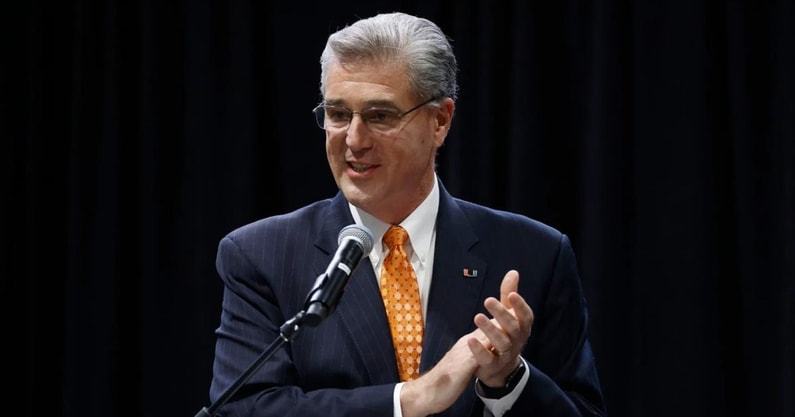Despite lack of unanimous vote, Dan Radakovich believes ACC expansion will 'solidify the conference'

The ACC officially welcomed Cal, Stanford and SMU to the league on Friday after the conference’s brass finally secured enough votes to move forward with the conference expansion.
Though the decision wasn’t unanimous, Miami athletic director Dan Radakovich didn’t think it was a big deal that not everyone voted for inclusion.
“People talk a lot about that kind of issue of not having a unanimous vote, but there’s so many things that happen within the league that are unanimous votes,” Radakovich said. “So it’s not unusual for that to happen. But everybody had their thought process. Everybody had an opportunity to say their piece. As it ended up, we were able to bring those three quality institutions to the league.”
There were initially four schools blocking the move of the trio of schools to the ACC, with the ACC rules requiring 12 of 15 members to vote affirmatively on a potential conference expansion.
But Clemson, Florida State, North Carolina and NC State had previously voted against inclusion.
NC State flipped its vote, paving the way for the move to happen. It will give the ACC 18 teams for the 2024 season as the three newcomers arrive.
Radakovich praised ACC commissioner Jim Phillips for managing the entire process despite not having a unanimous vote from his league’s members.
Top 10
- 1Breaking
Boo Carter
Transfer portal rumors no more
- 2
Greg Gumbel
Legendary broadcaster passes
- 3New
Squirrel White
Tennessee WR plans to enter transfer portal
- 4Hot
Saban rips Ohio State fans
'They need to go get therapy'
- 5
Harold Perkins
LSU announces decision on 2025
Get the On3 Top 10 to your inbox every morning
By clicking "Subscribe to Newsletter", I agree to On3's Privacy Notice, Terms, and use of my personal information described therein.
“First of all I’ve got to give great credit to commissioner Phillips being able to deal with all of the presidents and the presidents’ wisdom to be able to move forward with this, to make this happen,” Radakovich said. “I think this is going to really help solidify the conference financially, academically and athletically. I think those are all going to be really good things for the ACC coming into the near term and well into the future, as well.”
Will conference expansion appease members?
One of the reasons conference expansion was viewed as a must by the ACC is because of the constant threats by programs like Florida State to pus for a better revenue deal or seek an exit from the conference.
Phillips spoke to whether the new conference expansion might alleviate those concerns.
The addition of the three schools adds $72 million in revenue from ESPN every year to the ACC — with SMU not receiving any of the television revenue money for the first nine years.
Cal and Stanford will receive split of the television revenue, but at a lesser price.
“I know that there’s something in this for everybody,” Phillips said during a Friday press call. “No one can deny that. It also takes a step forward towards it. Maybe it’s not enough. Maybe it is. But we are doing everything we can within the conference to address that piece of it. The success initiative, let’s let that play out. Let’s see what that looks like. Let’s see how much revenue is generated and then distributed to those that maybe have more success in football.
“I’m not ready to say that it doesn’t or it will or might. I want to get this structure in place and let us move forward. I’d encourage you to talk to the folks that voted no on this and see what their thoughts are. But I felt and came away and my staff and the chair came away that this was a very good outcome for the ACC. It has something for everyone. It may not have everything for everyone. But whether you voted for it or not, you’re going to benefit from this new arrangement and these three world class schools joining the ACC.”